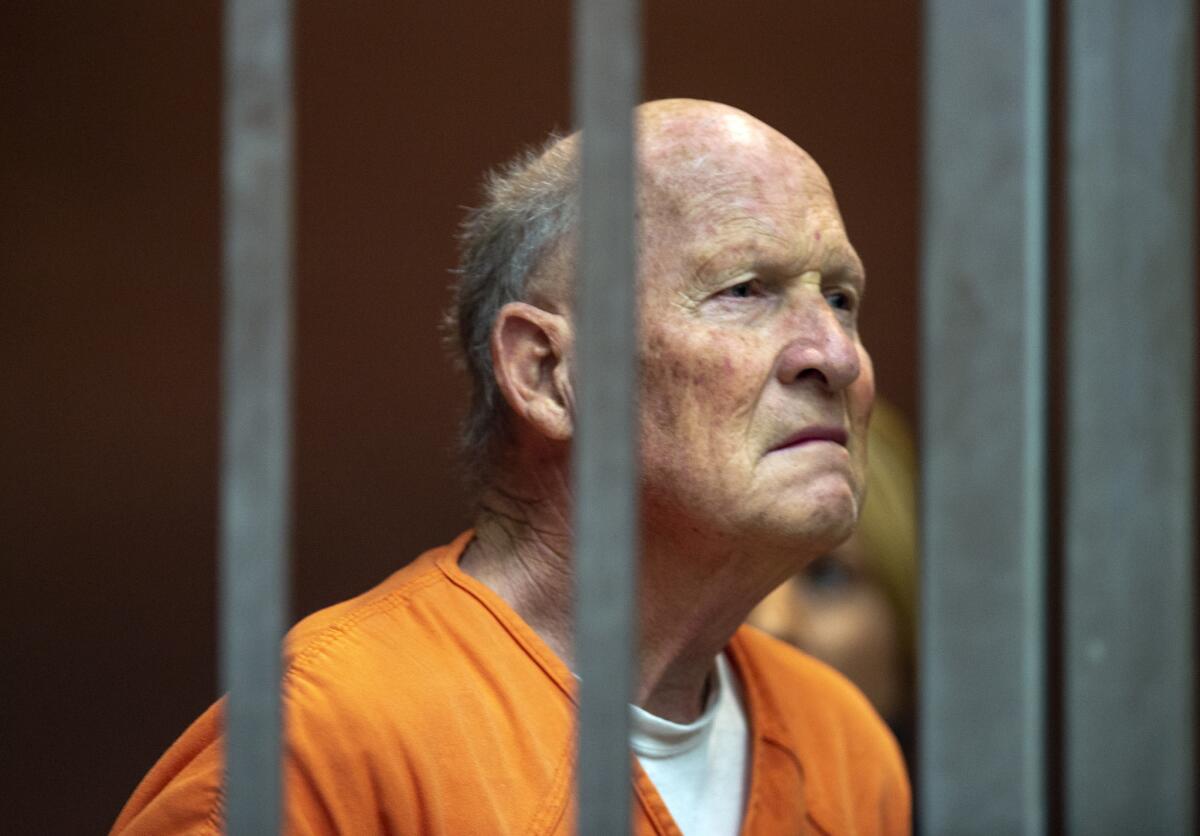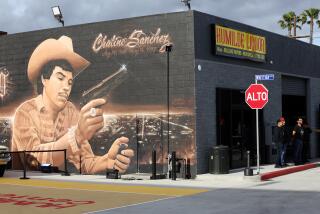Prosecutors challenge Golden State Killer’s apparent frailty, say he chooses not to show remorse

- Share via
In his court appearances, the man known as the Golden State Killer sits with a slack face, hunched in his wheelchair, thin and pale.
At a hearing in June where he formally admitted his crimes, the 74-year-old was barely able to utter “guilty” and “I admit” to charges of 13 murders and 50 rapes.
But prosecutors allege that video recordings of Joseph James DeAngelo Jr. while behind bars show a much different man, one they want to show the public.
“The defendant has come to court, oftentimes with his mouth agape, his head cocked to the side, his hands twisted and held in an awkward angle,” Sacramento County Deputy Dist. Atty. Thienvu Ho told a judge Monday.
“The blank stare, the halting answers that sometimes burst forth in gasps of breath, might lead some to suspect or later contend that he is physically or mentally deficient,” Ho said. “He has portrayed himself as being feeble and frail, as someone who is physically unable to express remorse....The fact of the matter is, he consciously chose not to do so.”
But a Sacramento County Superior Court judge on Monday denied a request by prosecutors to unseal the jailhouse tapes and play them in court, calling evidence of a fitter, even agile DeAngelo meaningless to the 26 life sentences the judge is scheduled to hand to him Friday.
“Whether or not he can stand up on his bunk or not stand up on his bunk is of little relevance,” Judge Michael Bowman said in a brief pre-sentencing court hearing held by video chat and streamed live on the court’s YouTube channel.
Monday’s hearing marked the start of an extraordinary week in the criminal case, when dozens of the Golden State Killer’s victims or their relatives are expected to confront DeAngelo in court and deliver victim impact statements.
DeAngelo, a former police officer, terrorized California for more than a decade. His crimes ran from at least 1973 to 1986 and involved attacks on at least 106 children, men and women in 11 counties, ranging from Sacramento to Orange. Some 50 women and girls were raped and 13 people murdered, including couples bludgeoned to death in bed.
Shortly after his arrest in April 2018, DeAngelo was placed in one of the few jail cells that allow video monitoring. Prosecutors told Bowman that public defenders were aware of the recordings, intended in part to ensure that no harm came to the jail’s most notorious occupant.
Prior to his arrest, DeAngelo was active, riding a racing bike through his suburban Sacramento neighborhood, or his motorcycle on the freeway. But since then, he has looked frail and feeble, and has shed a dramatic amount of weight.
In June, during an eight-hour proceeding held at a university ballroom to accommodate both COVID-19 safety measures and a throng of victims and their family members, sheriff’s deputies rolled DeAngelo onto the elevated platform in a wheelchair. His defense lawyers said DeAngelo requires a cane but could walk — the wheelchair was used at the request of court security officers who sought a quick way to remove DeAngelo from the room if needed.
Prosecutors and some victims allege DeAngelo has cultivated an image as a frail old man in an effort to evoke sympathy from the court and perhaps better prison housing.
They say it is an affront to those who seek to see the former cop and family man who lived a double life as a serial killer show some measure of remorse. But while they point out sharp disparities in DeAngelo’s appearance in and out of court, prosecutors have stopped short of openly accusing him of fakery.
“If you were to put that evidence in front of a jury, I think they could conclude one thing. And I think those victims know exactly what’s going on in Mr. DeAngelo’s head,” Sacramento County Dist. Atty. Anne Marie Schubert said after the June hearing.
“I would love to know who he really is,” said Kris Pedretti, who was 15 in 1976 when she was repeatedly raped by DeAngelo. “Like, I know it’s an act.”
Victims already have heard their own stories of a dual DeAngelo. A jail official, for instance, told Pedretti of watching DeAngelo joking one day with his guards, until three people from the district attorney’s office walked into the room. “When he saw them, he reverted right back to not being able to speak and being weak,” she said the officer told her.
At the June hearing, DeAngelo entered guilty pleas to 13 murders and 13 counts of kidnapping for robbery — each carrying a life sentence. In addition, he admitted raping 50 women and girls, and threatening and torturing their male companions. In return, prosecutors agreed to not seek the death penalty. Instead, in a measure of the extraordinary nature of the crimes, they ask that DeAngelo be sentenced to 11 consecutive life without parole sentences, plus 15 more life sentences to be served at the same time.
DeAngelo’s public defenders did not object to the prosecutor providing the court with sealed copies of the videos to be considered by the judge during sentencing, but they opposed a public showing.
“There’s nothing about his demeanor in court that shows a lack of remorse,” said one of his lawyers, Alice Michel. She called the tapes “completely irrelevant. It’s a grotesque violation of his privacy.”
Ho attempted to enter at least a description of what is on the sealed tapes into the court record, saying they include an incident when DeAngelo climbed up on something in his cell in order to adjust the lighting. He also attempted to tell the judge that other tapes show DeAngelo “committing a sexual act while watching someone outside of the cell” before Judge Bowman cut him off.
More to Read
Sign up for Essential California
The most important California stories and recommendations in your inbox every morning.
You may occasionally receive promotional content from the Los Angeles Times.














